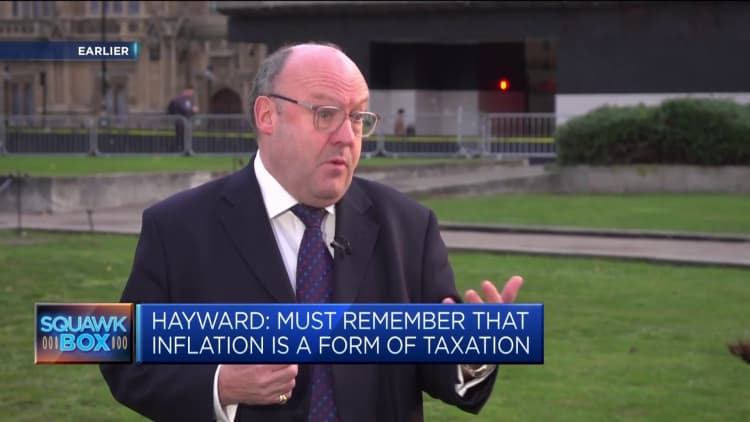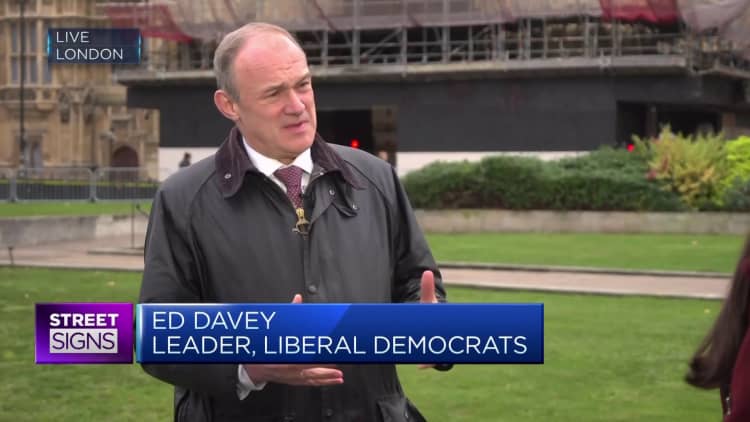[ad_1]
British Finance Minister Jeremy Hunt that the U.K. economy would not enter a technical recession in 2023, while announcing the government’s spring Budget.
Dan Kitwood | Getty Images News | Getty Images
LONDON — U.K. Finance Minister Jeremy Hunt on Wednesday announced a substantial cut to the National Insurance tax on workers, but its benefit to payers will be dwarfed by the effect of existing freezes on personal tax thresholds — known as the “fiscal drag.”
The U.K. National Insurance is a tax on workers’ income and employers’ profits to pay for state social security benefits, including the state pension.
Trailing the main opposition Labour Party substantially in the polls ahead of a general election, Prime Minister Rishi Sunak’s Conservative government was keen to offer a carrot to voters who have been pummeled by a cost-of-living crisis over the last couple of years.
Hunt therefore announced that National Insurance for workers would be cut from 12% to 10%, benefiting 27 million people and saving someone on the national average yearly salary of £35,000 ($43,774.50) over £450. The reduction will cost the government around £10 billion.
Touted by the Conservative party as the “largest ever tax cut for workers,” the move nevertheless does not shield taxpayers from the effect of frozen tax thresholds that tip more of their income into higher tax brackets, as nominal wages rise.
The independent Office for Budget Responsibility highlighted that the continuing impact of multiple freezes and reductions to personal tax thresholds in recent years means that the cut to NI is a drop in the ocean, compared to what the Treasury will be raking in over the next few years.

“High levels of inflation and the impact of fiscal drag means they are now expected to raise a combined £44.6 billion in 2028-29,” the OBR said in its medium-term outlook published Wednesday.
In March 2021, then-Finance Minister Rishi Sunak announced that the personal allowance (PA) and higher-rate thresholds (HRT) of income tax would be frozen for four years until April 2026. Hunt then extended that freeze to 2028 in his 2022 Autumn Statement.
The PA was frozen by Sunak in 2021 at £12,750, with the HRT set at £50,270. Alongside extending the freezes, Hunt in November 2022 froze the upper earnings limit for NI contributions and lowered the additional rate hold from £150,000 to £125,140 from April 2023.
Freezing the tax thresholds, rather than increasing them in line with inflation, means that, as nominal wages rise, millions more people are tipped into higher tax brackets, or into the tax system having previously been below the required income level.
“Between 2022-23 and 2028-29, this set of threshold freezes means nearly 4 million additional individuals will be expected to pay income tax, 3 million more will have moved to the higher rate, and 400,000 more onto the additional rate,” the OBR said.

Relative to raising thresholds in accordance with inflation, these freezes are now expected to raise the Treasury £44.6 billion by the end of the forecast period in 2029, or 1.4% of GDP, while Hunt’s cut to NI will “reduce the impact of the primary threshold freeze by only around £180 million.
“Frozen thresholds are the largest contributor to the rising overall economy-wide tax burden – responsible for almost a third the 4.5 per cent of GDP increase in taxes from 2019-20 to 2028-29,” the OBR added.
Torsten Bell, chief executive of the Resolution Foundation, pointed out on Wednesday that despite the 2p cut to NI, the vast majority of the country will be worse off, with only those earning around £11,000 to £13,000 per year and around £42,000 to £52,000 a year benefiting.
Younger workers to foot the bill
Paul Johnson, director of the Institute for Fiscal Studies, said that despite Hunt’s optimism, the U.K.’s public finances “haven’t meaningfully improved,” with the growth outlook still weak and inflation expected to stay higher for longer.
“Higher inflation pushes up tax receipts by more than it pushes up spending on debt interest or social security benefits; but rather than use the proceeds to ease the ongoing ‘fiscal drag’ effects of threshold freezes, or to compensate public services for higher costs, the Chancellor opted to cut other taxes,” he said.
“His immediate cut to National Insurance will put more money into workers’ pockets when it comes in but won’t be enough to prevent this from being the biggest tax-raising parliament in modern times.”

Though he acknowledged that cutting NI is preferable to cutting personal income tax rates and may help to boost employment, Johnson noted that these tax cuts have been “paid for” by letting the fiscal drag manifest as an even larger medium-term tax increase and a bigger squeeze on both public service budgets and investment.
Michael Ben-Gad, professor of economics at City, University of London, said the burden of funding the future spending commitments of Wednesday will fall most heavily on younger workers, as the population ages and retirement grows.
“Young people have reason to feel aggrieved by policies such as the triple lock that ratchets up state pensions year after year (8.5% in this budget statement) while their own incomes are eaten away by both inflation and higher taxes through fiscal drag,” he said in an email.
[ad_2]
Source link

